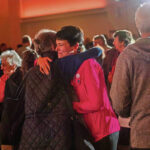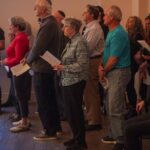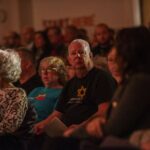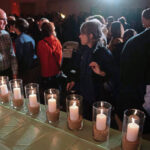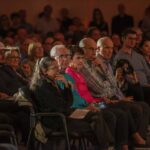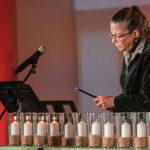If kindness can counteract one incalculable act of hate, that spirit was alive in Pittsburgh’s Jewish community Sunday, six years after the worst antisemitic attack in U.S. history claimed 11 people in a Squirrel Hill synagogue.
Even before an evening ceremony honoring victims of the Tree of Life mass shooting — a somber service in Squirrel Hill that drew more than 400 attendees — community members showed resolve and a desire to heal through volunteer efforts in Pittsburgh and beyond.
The community as a whole, and fellow worshippers in particular, have sought each year to ensure those killed are not forgotten. The victims were Joyce Fienberg, Richard Gottfried, Rose Mallinger, Jerry Rabinowitz, Cecil Rosenthal, David Rosenthal, Bernice Simon, Sylvan Simon, Daniel Stein, Melvin Wax and Irving Younger.
Inside the Jewish Community Center in Squirrel Hill, turnout for the 5:30 p.m. service was double the 200 chairs set up in a ground floor hall. Attendees included shooting survivors, relatives of the victims, politicians and others, among them Justin Sypolt, 40, a city paramedic who treated victims inside the synagogue that day. He has attended every annual commemoration since.
“It allows us all to heal together,” he said.
Candles were lit for each of the 11 victims, and their names were read aloud to a room that fell silent. Artwork from area schoolchildren adorned a lobby as soothing strains from a harp and hammered dulcimer greeted those entering the service.
Afterward, Tree of Life Rabbi Jeffrey Myers spoke of a political climate nationally that has emboldened individuals to publicly show hate for Jews. America needs to decide “what kind of country we want to be,” he said.
Earlier in the day, volunteers hoping to welcome immigrants to the city sorted donations and crafted welcome cards and posters with Jewish Family and Community Services. In another, felted hearts were created either to adorn the ceremony in the Squirrel Hill Jewish Community Center or to deliver to friends, family, loved ones, neighbors or strangers.
Events like Sunday’s service are important, Myers said, because “if we don’t remember, we forget, and if we forget, we don’t learn the lessons of that day. And that’s critically important to learn those lessons of the day so that this doesn’t happen again.”
In addition to the 11 killed, six were wounded, including Pittsburgh police officers who raced to the synagogue and captured the killer.
A shattered morning
Much has happened since 9:54 a.m. Oct. 27, 2018, when the first of dozens of gunshots pierced what had been a tranquil Saturday morning in Squirrel Hill.
The shooter, a truck driver and high school dropout, was convicted last year of 63 federal counts. Most of the Tree of Life-Or L’Simcha building at the corner of Shady and Wilkins avenues was razed, and a new house of worship with tributes to the deceased is moving forward, backed by a drive to raise $75 million.
But six years after placards declared that Pittsburgh was “stronger than hate,” global events have complicated attempts to heal. Acts of antisemitism are on the rise nationally, in particular since the Oct. 7, 2023, Hamas attack on Israel that killed 1,200 and the ensuing Israeli military campaign in Gaza that has killed tens of thousands of Palestinians.
Those in Pittsburgh’s Jewish community — many still coming to grips with the killings — have said they want as much as possible to keep the spotlight off the gunman, Robert Bowers of Baldwin, who at age 50 was sentenced to death on Aug. 3, 2023, after a monthslong jury trial.
Found guilty of all counts against him, he is on death row in an Indiana penitentiary.
In a statement issued in advance of Sunday’s ceremony, Pittsburgh Mayor Ed Gainey said the shooter, a white nationalist, was “driven by antisemitic conspiracies and lies (and) took up arms in order to kill Jewish people, murdering 11 beloved community members and leaving our city forever changed.”
The shooter “was motivated by an antisemitic and anti-immigrant ideology that has tragically gained purchase in our media, in the halls of Congress and in our elections,” he said.
Gainey said that by reaching across cultures, “We can shut down the engines of fear that seek to divide us. From the streets of our neighborhoods to the doors of our holy spaces, freedom and safety for any of us depends on freedom and safety for everyone.”
Maggie Feinstein, director of 10.27 Healing Partnership, told the gathering that the community has been heartened by learning new stories about ways the 11 murders had impacted the community.
After Sunday’s service, she said, “I’m very hopeful.”
Jason Kunzman, president and CEO of the JCC of Greater Pittsburgh, put it another way.
“We’re six years out, and our journey of healing is a long one, but I will say that with each passing year, the ability to look toward the future becomes just a smidge easier,” he said.











